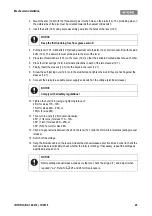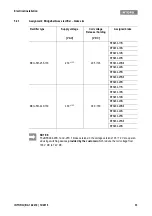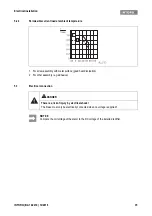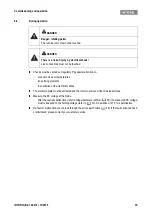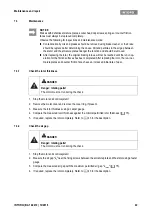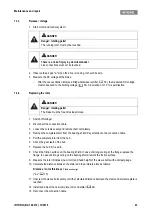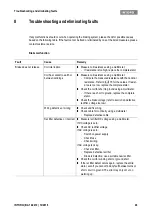
Maintenance and repair
INTORQ | BA 14.0210 | 12/2016
41
7.2
Inspections
To ensure safe and trouble-free operations, the spring-applied brakes must be checked at regular intervals
and, if necessary, replaced. Servicing will be easier at the plant if the brakes are made accessible. This must
be considered when installing the drives in the plant.
Primarily, the required maintenance intervals for industrial brakes result from their load during operation.
When calculating the maintenance interval, all causes for wear must be taken into account,
40. For
brakes with low loads (such as holding brakes with emergency stop function), we recommend a regular in-
spection at a fixed time interval. To reduce costs, the inspection can be carried out along with other regular
maintenance work in the plant.
Failures, production losses or damage to the system may occur when the brakes are not serviced. Therefore,
a maintenance strategy that is adapted to the particular operating conditions and brake loads must be de-
fined for every application. For the spring-applied brakes, the maintenance intervals and maintenance oper-
ations listed in the table below must be followed. The maintenance operations must be carried out as
described in the detailed descriptions.
7.2.1
Maintenance intervals
Type
Time interval
for service brakes:
for holding brakes with emergency stop:
BFK464
-
S/S.1
❚
according to the service life
calculation
❚
or else every six months
❚
after 4000 operating hours
at the latest
❚
at least every 2 years
❚
after 1 million cycles at the latest
Maintenance
Inspections with assembled brake:
Inspections after the brake has been
removed:
❚
Check release function and
control
❚
Check the play of the rotor
gear teeth (replace worn-out
rotors)
❚
Measure the air gap (adjust
if required)
❑
Check for breaking out of the
torque support at the sleeve
bolts and the armature plate
❚
Measure the rotor thickness
(replace rotor if required)
❚
Check the springs for damage
❚
Check for thermal damage
of the armature plates or
flange (dark-blue tarnishing)
❚
Check the armature plate and
flange or bearing shield
- Levelness < 0.1 mm
- Max. run-in depth = rated
air gap for the size
Summary of Contents for WSG-TB.3 series
Page 29: ......
Page 30: ......
Page 31: ......
Page 33: ......
Page 37: ......
Page 38: ......
Page 39: ......
Page 43: ......
Page 44: ......
Page 45: ......
Page 46: ......
Page 47: ......
Page 95: ...Notes INTORQ BA 14 0197 04 2016 48 Notes...
Page 144: ...Notes INTORQ BA 14 0210 12 2016 48 Notes...
Page 145: ...Notes INTORQ BA 14 0210 12 2016 49...
Page 146: ...Notes INTORQ BA 14 0210 12 2016 50...
Page 147: ......



